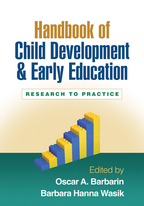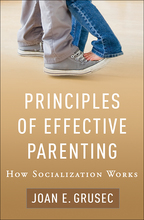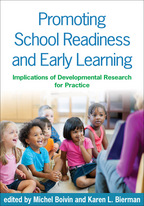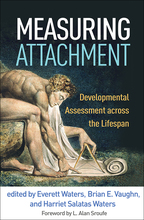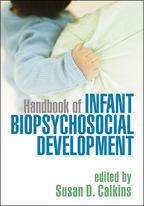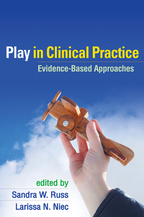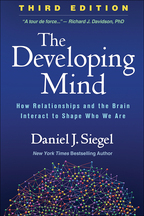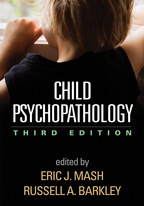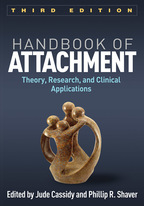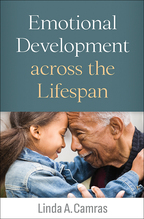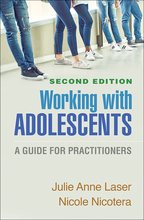Handbook of Child Development and Early Education
Research to Practice
Edited by Oscar A. Barbarin and Barbara Hanna Wasik
Hardcovere-bookprint + e-book
Hardcover
orderJuly 8, 2009
ISBN 9781606233023
Price: $136.00 624 Pages
Size: 7" x 10"
“The range of this text is tremendous and the scholarship that underpins it is impressive....In an area that is seeing a proliferation of edited collections presented as handbooks this text stands out for its vision in linking through new theoretical developments and theorized pedagogical developments. It will serve as a resource for all engaged with early years professionals, as a standby for academics, and a must for those engaging with early childhood education as students. My students will have to buy their own because mine is staying close to me, it will serve me as a teaching resource and an inspiration for my future professional work.”

—Educational Review
“Cohesively and clearly summarizes current research from developmental psychology and also offers concrete suggestions for how to incorporate this information into appropriate learning experiences for young children....The book should be of interest not only to educational psychologists, early childhood educators, and graduate students in these areas, but also to those involved with educational administration and policy making. It is comprehensive, detailed, accurate, and easily understandable—a rare combination. It takes a biopsychosocial approach, bringing together current research from education, psychology, and other developmental sciences.”

—PsycCRITIQUES
“The editors and contributors address many of the questions, tensions, and controversies in contemporary early childhood education through the synthesis of research in developmental science. A powerful overall theme framed by the editors and echoed by the contributors is that science and education would be served well by more and better engagement; educators would more effectively support children's learning with better understanding of child development theory and research, and researchers would be more adept at defining and studying problems when informed by children in classrooms. This recommendation is more than abstract, however, as each chapter contains specific recommendations based on research evidence....Researchers, graduate students, teacher preparation faculty, and administrators of educational systems would likely appreciate and benefit from what the Handbook has to offer.”

—Journal of Applied Developmental Psychology
“Fills the void for a compilation of empirically validated early learning classroom practices which take into account the individual needs of developing children....Although the chapters are interrelated, each one is self-contained with its own theoretical framework for understanding early learning and development from a socio-cognitive perspective....Makes a good literature review resource for researchers and graduate students in Child Development and Early Education....The breadth of issues covered by this handbook makes it a valuable resource for child related professionals such as K-3 practitioners, reading specialists, developmental and educational psychologists, early education policy makers, early education faculty, researchers, and parents....The handbook may be used as a supplementary text to help teacher-education students understand how research findings and the concepts they learn in their child development classes are applicable to teaching and learning during these early years....Students taking methods courses in Early Childhood Education, Elementary Education, Reading Education, Math Education, and Science Education will find valuable information about effective programs and instructional practices for their respective fields within the handbook. Suggestions for future research are contained within most of the chapters. Hence, graduate students and researchers seeking new directions for research in Child Development and Early Childhood Education would find the handbook a worthwhile read....The rare usage of psycho-social theories to discuss socio-emotional competence in Part III of the handbook was a refreshing change to the mostly socio-cognitive framework.”

—Education Review
“This authoritative text draws together important research into early childhood development. It would be of value as a text for students specializing in early years as well as teachers and other professionals engaged in higher education programmes.”

—SEN (Special Education Needs) Magazine
“This exceptionally comprehensive and accessible volume will be of value as a text in programs preparing early childhood educators, as a basis for professional development, and as a handy resource for early childhood researchers. In addition, it provides a solid research basis for effective arguments to policymakers and the public about the importance of high-quality early childhood programs for children's development and later academic achievement.”

—Catherine E. Snow, PhD, Henry Lee Shattuck Professor of Education, Harvard University
“A 'must have' for early childhood educators. This volume helps the reader keep abreast of the diverse knowledge bases that underlie the teaching of young children, and shows how applying research and theory can aid in preparing children for school. Coverage includes basic neural changes in infancy, typical socioemotional development, the effects of relationships and culture, and teaching and learning in specific content areas. The chapters provide a solid framework for novices and a terrific catch-up for seasoned professionals, with excellent bibliographies and cross-references. Barbarin, Wasik, and company have done the field a great service.”

—Barbara Bowman, MA, Irving B. Harris Professor of Child Development, Erikson Institute, Chicago, Illinois
“This handbook fills a unique niche by bringing together the best of developmental science with the best of early education. By taking a biopsychosocial approach, it provides the reader with the latest science relevant to early education. The benefits of this information are amplified by educators proposing specific recommendations for the translation of developmental research into more effective educational practice during the preschool and early school years.”

—Arnold J. Sameroff, PhD, Center for Human Growth and Development, University of Michigan
—Educational Review
“Cohesively and clearly summarizes current research from developmental psychology and also offers concrete suggestions for how to incorporate this information into appropriate learning experiences for young children....The book should be of interest not only to educational psychologists, early childhood educators, and graduate students in these areas, but also to those involved with educational administration and policy making. It is comprehensive, detailed, accurate, and easily understandable—a rare combination. It takes a biopsychosocial approach, bringing together current research from education, psychology, and other developmental sciences.”
—PsycCRITIQUES
“The editors and contributors address many of the questions, tensions, and controversies in contemporary early childhood education through the synthesis of research in developmental science. A powerful overall theme framed by the editors and echoed by the contributors is that science and education would be served well by more and better engagement; educators would more effectively support children's learning with better understanding of child development theory and research, and researchers would be more adept at defining and studying problems when informed by children in classrooms. This recommendation is more than abstract, however, as each chapter contains specific recommendations based on research evidence....Researchers, graduate students, teacher preparation faculty, and administrators of educational systems would likely appreciate and benefit from what the Handbook has to offer.”
—Journal of Applied Developmental Psychology
“Fills the void for a compilation of empirically validated early learning classroom practices which take into account the individual needs of developing children....Although the chapters are interrelated, each one is self-contained with its own theoretical framework for understanding early learning and development from a socio-cognitive perspective....Makes a good literature review resource for researchers and graduate students in Child Development and Early Education....The breadth of issues covered by this handbook makes it a valuable resource for child related professionals such as K-3 practitioners, reading specialists, developmental and educational psychologists, early education policy makers, early education faculty, researchers, and parents....The handbook may be used as a supplementary text to help teacher-education students understand how research findings and the concepts they learn in their child development classes are applicable to teaching and learning during these early years....Students taking methods courses in Early Childhood Education, Elementary Education, Reading Education, Math Education, and Science Education will find valuable information about effective programs and instructional practices for their respective fields within the handbook. Suggestions for future research are contained within most of the chapters. Hence, graduate students and researchers seeking new directions for research in Child Development and Early Childhood Education would find the handbook a worthwhile read....The rare usage of psycho-social theories to discuss socio-emotional competence in Part III of the handbook was a refreshing change to the mostly socio-cognitive framework.”
—Education Review
“This authoritative text draws together important research into early childhood development. It would be of value as a text for students specializing in early years as well as teachers and other professionals engaged in higher education programmes.”
—SEN (Special Education Needs) Magazine
“This exceptionally comprehensive and accessible volume will be of value as a text in programs preparing early childhood educators, as a basis for professional development, and as a handy resource for early childhood researchers. In addition, it provides a solid research basis for effective arguments to policymakers and the public about the importance of high-quality early childhood programs for children's development and later academic achievement.”
—Catherine E. Snow, PhD, Henry Lee Shattuck Professor of Education, Harvard University
“A 'must have' for early childhood educators. This volume helps the reader keep abreast of the diverse knowledge bases that underlie the teaching of young children, and shows how applying research and theory can aid in preparing children for school. Coverage includes basic neural changes in infancy, typical socioemotional development, the effects of relationships and culture, and teaching and learning in specific content areas. The chapters provide a solid framework for novices and a terrific catch-up for seasoned professionals, with excellent bibliographies and cross-references. Barbarin, Wasik, and company have done the field a great service.”
—Barbara Bowman, MA, Irving B. Harris Professor of Child Development, Erikson Institute, Chicago, Illinois
“This handbook fills a unique niche by bringing together the best of developmental science with the best of early education. By taking a biopsychosocial approach, it provides the reader with the latest science relevant to early education. The benefits of this information are amplified by educators proposing specific recommendations for the translation of developmental research into more effective educational practice during the preschool and early school years.”
—Arnold J. Sameroff, PhD, Center for Human Growth and Development, University of Michigan

